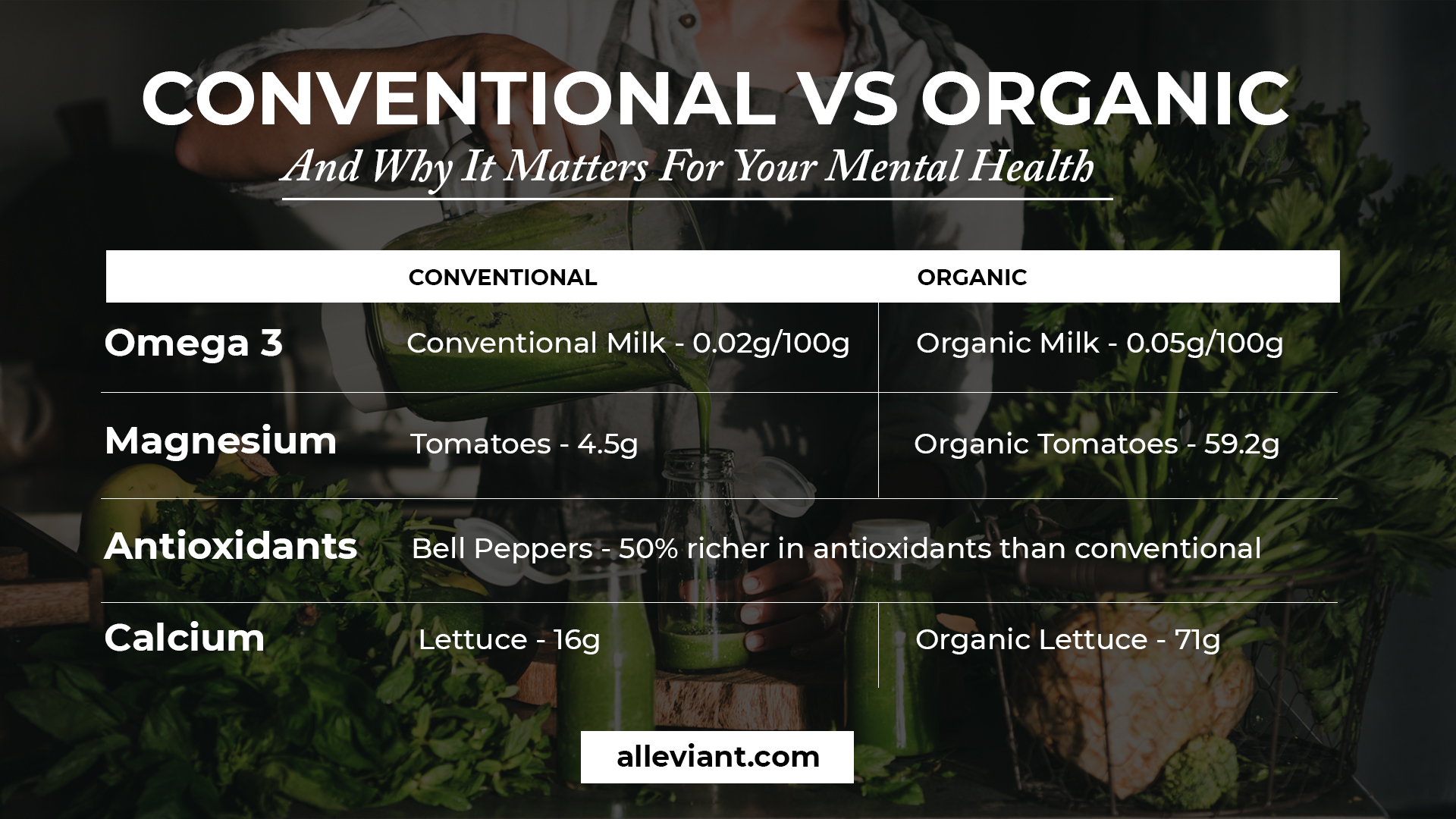When you’re standing in the aisle at the grocery store, trying to decide between organic vs. non-organic food, how do you make up your mind? A lot of people wonder whether or not it’s worth coughing up the extra money to purchase that organic label. Some say it’s a trendy fad, and others claim that organic food is the key to a healthy life.
If you or a loved one have questions about nutrition and mental health, reach out to Alleviant today to learn about our eating disorders treatment.
What is Organic Food, Exactly?
“Organic” is a label that the U.S. Department of Agriculture gives to certify that food has been produced under specific standards. Here’s the official definition:
Organic is a labeling term that indicates that the food or other agricultural product has been produced and processed using approved methods. These methods integrate cultural, biological, and mechanical practices that foster cycling of resources, promote ecological balance, and conserve biodiversity. Synthetic fertilizers, sewage sludge, irradiation, and genetic engineering may not be used.
Basically, organic food has been produced without harmful pesticides, fertilizers, GMOs, and antibiotics and growth hormones in animals. But there’s more to it than that. Organic farming relies on biodiversity, composting, and natural defenders against diseases and insects. It helps farmers stay more connected to the natural rhythms and local biodiversity of their region.
The word organic functions as a legal word for marketing purposes. When you buy a product with the organic seal, you know that it’s come from a farm that’s submitted to the regulations from the USDA. Organic farms are subjected to yearly evaluations to make sure that they are still compliant with organic standards.
What Are the Benefits of Organic Farming?
Originally, the organic food movement was more focused on doing what is good for the planet—not necessarily what is good for nutrition. Industrial agriculture arose in the early 1900s, as increases in technology made it easier to produce large quantities of food at a cheap price. Through using synthetic fertilizers, pesticides, and herbicides industrial farms churn out billions and billions of pounds of food every year.
In addition to utilizing harmful chemicals, industrial agriculture does not rotate crops on the land, which leads to depleting nutrition in the soil and, eventually, soil erosion.
Organic farming arose in the 1940s to combat the negative trends in industrial agriculture. The primary goal is to foster the intercommunity of soil life, plants, and people. It takes a broader and more holistic approach to food production. Organic farming seeks to cultivate healthy soil, full of vibrant microorganisms that make it the perfect breeding ground for healthy crops. As a result, it’s not essential to rely on pesticides and synthetic fertilizers to produce food.
There are a few ways that organic farming is better than conventional farming:
- The production is gentler to the planet and kinder to the environment.
- It’s more farmer-centric and aware of the small farming needs.
- Organic farmers are required to rotate crops on the same plot of land throughout the year, which reduces soil erosion.
- Organic farming methods are generally more humane for animals. There are more free-range and grass-fed options.
- Antibiotics and growth hormones are not used on animals.
- There is far less pollution of the environment from pesticides.
In our post-industrial and consumeristic culture, we’ve lost touch with the source and production of our food. Most people don’t even know how it’s made! The organic movement, at its core, is about bringing people back to the earth and into a natural rhythm with the seasons.
Organic vs. Conventional Food
So, if organic farming is better for the earth, then it’s probably better for your health, right? There is one primary health benefit to eating organic food and avoiding conventional food: You avoid eating some nasty things—including a few known carcinogens! But why are organic foods better?
These are the harmful substances that you avoid when eating organic food:
- Pesticides
- Antibiotics
- Toxins
- Sewage sludge
- GMOs (genetically modified organisms)

If you or a loved one have questions about nutrition and mental health, reach out to Alleviant today.







